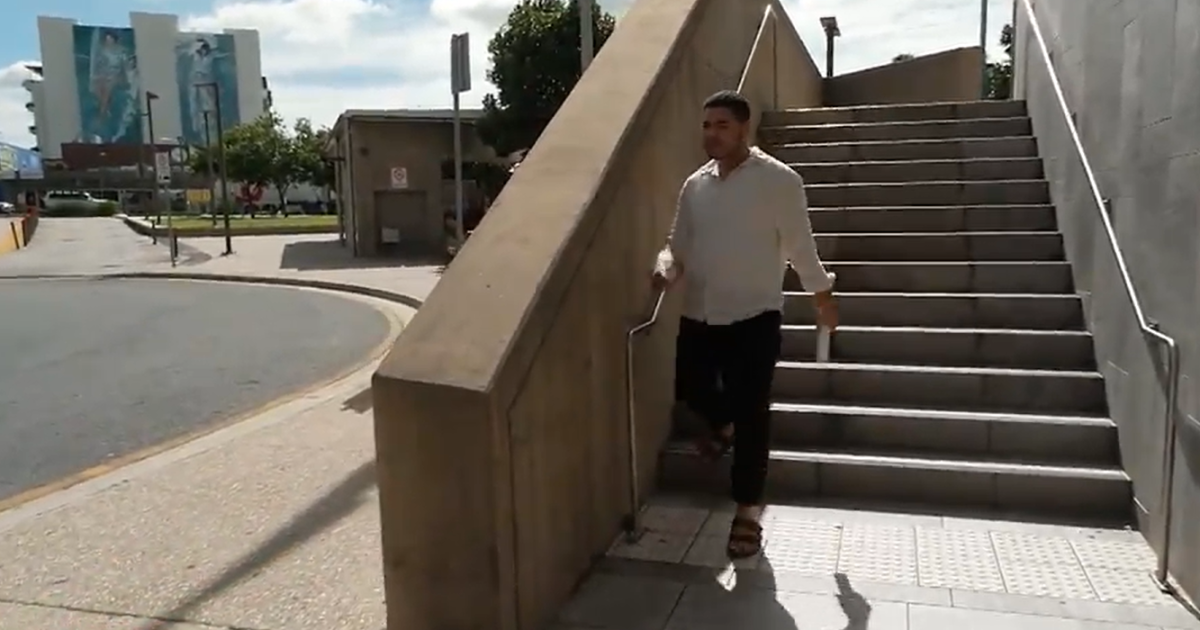Un Australien condamné pour avoir harcelé en ligne un arbitre lors de la Coupe du Monde de Rugby 2023

Par un communiqué publié lundi 8 avril, World Rugby « salue les poursuites engagées contre une personne ayant envoyé des messages injurieux sur les réseaux sociaux, visant un officiel de match de la Coupe du Monde de Rugby 2023 et des membres de sa famille ».
Le match en question était le match de la poule D Angleterre-Samoa du 7 octobre à Lille que les Anglais avaient tout juste remporté (18-17). Les officiels de match avaient été vivement critiqués après que les Samoa se soient vu refuser un troisième essai en première période pour un en-avant.
Une amende symbolique
Il s’agit d’un jeune travailleur social australien de 22 ans originaire de Brisbane, Queensland, qui a envoyé des torrents de messages injurieux à l’arbitre TMO Brian MacNeice, et à sa femme, en mentionnant leurs enfants. L’audience s’est déroulée le 8 avril à Beenleigh. Le jeune homme a plaidé coupable et a exprimé des regrets à la barre.
Prétextant un état d’ébriété au moment des faits et mettant en avant son casier vierge, le natif de Nouvelle-Zélande a été condamné à une amende de 1000 dollars australien (600 euros) avec sursis pendant 12 mois assujettie à une obligation de bonne conduite. Cette condamnation ne sera pas inscrite à son casier judiciaire.
L’arbitre vidéo Brian MacNeice avait également été critiqué à la suite de la décision finale lors de la victoire de la France sur l’Écosse à Murrayfield pendant le Tournoi des Six Nations, lorsque l’Écossais Sam Skinner a semblé aplatir le ballon au sol sur la ligne d’essai, mais que le TMO n’a pas pu accorder l’essai en raison d’un manque d’éléments probants.
Identifié grâce à l’IA
L’identité du coupable a été découverte après que World Rugby a engagé les experts numériques Signify Group pour aider à surveiller les comptes sur les réseaux sociaux des officiels de match et des joueurs lors de la Coupe du Monde de Rugby en France.
À l’aide d’un système piloté par l’IA appelé « Threat Matrix », l’organisation a surveillé à la fois les réseaux sociaux orientés vers le public et les messages directs des arbitres, et a travaillé avec les plateformes de médias sociaux pour supprimer les contenus abusifs et bannir les comptes.
L’affaire avait été transmise aux autorités australiennes en vue de poursuites judiciaires.
L’auteur a été reconnu coupable d’utilisation de services de communication en ligne à des fins de menaces et harcèlement. En réponse, World Rugby envisage de prendre des mesures pour interdire à cette personne l’achat de billets pour les événements futurs organisés par l’organisation.
D’autres affaires sont en cours
« En outre, World Rugby est en mesure de confirmer que d’autres affaires sont en cours dans cinq juridictions à la suite de ce programme historique », est-il indiqué dans le communiqué.
Selon un rapport publié en début d’année par la fédération internationale de rugby, 58 % des comptes abusifs dont la localisation a été vérifiée étaient originaires d’Europe, 19% d’Afrique, 10% d’Océanie, 6% de Nouvelle-Zélande et 3% d’Amérique du Sud (avec 10 % d’abus provenant de régions hors compétition). Collectivement, le compte de l’équipe d’Angleterre et ses joueurs ont reçu le plus grand nombre d’abus.
Les officiels de match, dont les arbitres vidéo (TMO), ont reçu 49 % du total des abus du tournoi, tandis que Wayne Barnes a reçu à lui seul un tiers de l’ensemble des abus.
Un jugement historique
« World Rugby se félicite de ce jugement historique », a salué Alan Gilpin, le directeur général de World Rugby. « Les abus en ligne, odieux et toxiques, sont malheureusement monnaie courante pour de nombreux sportifs et personnalités publiques. Nous espérons que cela envoie un message fort aux trolls en ligne : un tel comportement est totalement inacceptable, et le sport ainsi que les autorités sont déterminés à prendre des mesures. »
Les poursuites interviennent alors que World Rugby annonce une extension de son partenariat avec Signify Group, dont le service Threat Matrix surveillera désormais les contenus abusifs visant tous les officiels de matchs hommes et femmes désignés par World Rugby ainsi que leurs familles au cours des trois prochaines années. Cette initiative s’inscrit dans la mobilisation continue du sport pour lutter contre les abus en ligne, couvrant des événements tels que les Tournois des Six Nations masculin et féminin ainsi que les tests de juillet et de novembre.


